- Home
- Nick Carter
Six Bloody Summer Days Page 2
Six Bloody Summer Days Read online
Page 2
At the outset, I had two avenues of approach: Mendanike's Pakistani widow, Shema, and the crew of the DC-7. The widow, because she might know the subject of the secret meeting between Ambassador Petersen and her late husband and the reason for the sudden flight to Budan. As for the crew of the DC-7, I wanted to discuss flight plans with them for obvious reasons.
Like I said, it was usual procedure. It was Hawk who said, "You've got a maximum of no time to find out if the Cockeye and the RPV are there."
Chapter 2
During the remainder of the trip down from the fishing camp, I committed to memory a bulk of background material that Hawk handed me. Mostly it dealt with the North African Peoples Republic.
Every AXE agent has an up-to-date picture of the geopolitical face of the globe. As Killmaster N3 my own knowledge is, of course, broad and deep. It has to be, so that in zeroing in on specifics, I'm already halfway there.
Of all the countries in the Maghreb, the NAPR is the poorest. It had been U.N.-created in the late '50s out of an arid slice of former French holdings. As a "newly emerged third world nation," its emergence had been purely political.
Its capital, Lamana, is a deep water port, strategically located and long coveted by the Soviets. Admiral S. G. Gorshkov, Commander-in-Chief of the Russian Navy had said, in secret testimony before the Central Committee of the Politburo, that Lamana was the key to control of the western Mediterranean. It didn't take a military genius to see why.
Preventing that control were relations between the NAPR's man of destiny, Ben d'Oko Mendanike and Washington. It was not a relationship cemented in good fellowship. The only thing Mendanike liked about the U.S. was its continuous flow of aid. He took it with one hand while verbally slapping the face of his benefactor every chance he got. But in return for the aid, he kept the Soviets out of bunkering rights in Lamana, and he was also smart enough to be afraid of having them on his territory.
There were some parallels to the situation in regard to Tito and the Soviet push for Adriatic ports. Mendanike's name was often linked to that of the Yugoslavian leader. In fact, the thick banner headline on the Montreal Star read: Mendanike, North African Tito Dead.
A Ceylonese by birth, educated at Oxford, Mendanike had grabbed power in 1964, deposing and killing old King Fahki in a bloody coup. Fahki's kinsman, Shiek Hassan Abu Osman, hadn't taken kindly to the switch, and when Washington refused to supply him with arms, he made a journey to Peking. His decade-long guerrilla campaign in the southern sector of the NAPR's sandpile around Budan got occasional press mention. Osman's numbers were few, but like Mustapha Barzani in Iraq, he wasn't about to quit, and his Chinese suppliers were patient.
Killed in the crash with Mendanike were six of his closest advisors. In fact, the only remaining member of his ruling coterie was General Salem Azziz Tasahmed. For reasons still unknown, he hadn't been hauled out of bed with the other six to make the unexpected flight on a one-way ticket to the obituary column.
Following the news of the crash, Tasahmed had declared marshal law and had announced that he would head a caretaker government. The General was forty, trained at St. Cyr, the former French West Point, and had been a Colonel at the time of the '64 coup. He had one wife, Mendanike's sister, and he and Ben had been heralded as pals to the death. On that point an AXE Inform read:
Tasahmed known to be dealing since June, 1974, with KGB agent A. V. Sellin, resident chief, Malta, attached to Hdqtrs. Black Sea Fleet, Vice Admiral V. S. Sysoyev, commanding.
As the Star clarioned, Mendanike's "tragic death" had brought outraged demands from a number of third and fourth world leaders for an emergency session of the U.N. Security Council. Accidental death was not accepted. The beleaguered CIA was again the whipping boy, and while it was not felt that the Security Council could bring about the resurrection of "the noted statesman and champion of peoples' rights," the meeting would give ample opportunity to vent spleen against U.S. imperialist war-mongers.
With all the additional background that Hawk had supplied me, my original evaluation had not shifted. Fact was, it had been reinforced. The situation had all the ingredients of the classic case of Soviet-inspired counter coup. And the only connecting link between Katzweiller and Lamana was an over-age DC-7 that had taken off on what appeared to be a routine flight, its one suspicious action the changing of its point of destination in midcourse.
By the time we had landed at the RCAF hanger at Dorval, I had changed into a business suit and had assumed the identity of Ned Cole of AP & WS. Whenever I am off duty, a fully-packed travel bag and special AXE attaché case is left at headquarters for a quick pickup, and Hawk had picked them up. Off duty or on, my standard apparel consists of Wilhelmina, my 9mm luger, Hugo, my arm secured stiletto, and Pierre, a walnut size killer gas bomb which I usually carry tucked in my jockey shorts. I've been frisked thoroughly more times than I can count, and one of the reasons I'm around to talk about it is because no one has thought to search in that location.
I stood on the flight line in the early evening darkness with Hawk, as he got ready to board the executive jet which would whisk him back to the capital. There was no further need to talk background details.
"Naturally, the President is damned anxious to have this thing wrapped up before it goes public," Hawk said, as he cupped his hands and fired up another cigar.
"I figure they're keeping it quiet for one of two reasons, maybe both. Wherever they've stashed the Cockeye, it's taking them time to get it set up on the RPV and to work in the avionics. It could be too complicated for them."
"What's the other reason?"
"Logistics. If its blackmail, demands have to be made, conditions met. It takes time to put a plan like that into operation."
"Let's hope it takes enough to give us enough… You feel okay?" It was the first mention he'd made of the reason for my having been fishing on a lake in Quebec.
"I can't stand long vacations."
"How's the leg?"
"Better. At least I have it, and that Tupamaro bastard is a head shorter."
"Hmmm." The end of his cigar glowed red in the chill dusk.
"Okay, sir," a voice called from the jet.
"Sorry to leave you with my fishing tackle," I said.
"I'll try my luck in the Potomac. Goodbye, son. Keep in touch."
"His hand was like ironwood."
A car took me to the airport terminal. On the short ride I stepped back into harness. The check-in was swift Security had been signaled to pass me with a cursory look at my attaché case and a patty-cake body search. The 747 hardly had a paying load. Even though I was traveling economy class, as any good news reporter, I had three seats to myself, which was fine for assimilation and sleep.
During drinks and dinner I did my assimilating. But as Hawk had said, it all came down to one thing. The stolen goods could be somewhere in the NAPR. If they were there, my mission was not only to locate them, but also to get rid of whoever had put them there. To aid me from above there would be satellite and SR-71 reconnaissance.
It used to be that truth was stronger than fiction. Now its violence that's way ahead of fiction. TV and movies and books can't keep pace. It has become a matter of one-upsmanship. And a major reason for the acceleration is because today in Los Angeles or Munich or Rome or Athens, those who butcher their fellow man too often get away with it. In the good old U.S.A. the do-gooders worry over the attackers, not the victims. AXE doesn't operate that way. Otherwise, it couldn't operate at all. Ours is an older code. Kill or be killed. Defend what needs defending. Get back whatever has fallen into the enemy's hands. No rules, really. Just results.
Chapter 3
The terminal building of Rome's Leonardo da Vinci Airport is basically a long glassed-in concave corridor with a gaggle of airline counters, expresso bars, and newsstands. The glass faces the flight line and there are descending ramps from a multitude of entrance gates where the planes of major airlines cluster together. The less prestigious carriers, going to
North Africa and points south and east are loaded off the rear wings of the terminal, which proves that at least in Rome, in spite of the newfound clout of the Arab oil producing nations, a certain set of distinctions is still observed.
The walk down the wide, heavily-populated corridor was good for two things — observation and the exercising of a convalescent leg. Observation was the more important. Since departing the Air Canada flight, I had known I was under surveillance. It's a built-in sense that comes from long experience. I never argue with it. It was there as I debarked up the ramp, and grew with the cappuccino I ordered at the expresso bar. It remained solid as I strolled to the newsstand and bought the Rome Corriere Delia Sera, and sat down in a nearby chair to peruse the headlines. Mendanike was still page one. The country was reported tense but under tight control. I decided it was time to go to the men's room to straighten my tie.
I had spotted him while examining the news from Lamana. He was small and wiry with a sallow complexion and nondescript clothes. He might have been from anywhere, a typical face in the crowd. It was his intent that interested me, not his anonymity. Only Hawk and AXE central control knew I was in Rome… supposedly.
In the men's room mirror my face glowered at me. I made a note to remind myself to smile more. If I wasn't careful I'd start looking like somebody's idea of a secret agent.
There was a fairly constant flow of traffic in an out of the room, but my little watcher did not enter. Too much of a pro perhaps. When I exited and went down the stairs to the main corridor he had disappeared.
There was plenty of time before my flight, but I walked to the far distant check-in point to see if I could flush him out. He did not flush. I sat down to think it over. He was real. His purpose probably had been to confirm my arrival and report it. To whom? I had no answer, but if his control was forewarned, so was I. Perhaps the advantage lay with the opposition, but they'd made a bad mistake. Their interest indicated Hawk's long shot had something going for it.
I went back to reading the Corriere. It was full of speculation on Mendanike's death and what it meant for the NAPR. The details of the crash coincided with those that Hawk had supplied. The plane had been making a normal ADF landing approach to the strip at the edge of the Budan Oasis. Normal in every way except that it had flown into the ground eight miles short of the end of the runway. The plane had exploded on impact. The cry was sabotage, but so far no one had been able to explain how the DC-6 had flown into the desert sand, wheels extended, its rate of descent apparently standard at a time when the weather was "gin clear" between daylight and darkness. This ruled out an explosion on board or another plane shooting Mendanike down. General Tasahmed was quoted as saying there would be a full investigation.
My fellow passengers began to gather. A mixed bag, predominantly Arab, some in western dress, others not. There were a few non-Arabs. Three, from their conversation, were French engineers, the other two were British heavy equipment salesmen. In view of the circumstances, I didn't think their timing to do business was all that good. But that sort of thing doesn't seem to bother the British.
The assembled group took cursory note of each other, checked their watches from time to time, and waited for the boarding crew to arrive to begin the ritual of check in and check over. Since the last Rome airport massacre, even the Arab airlines have begun to take security seriously. Wilhelmina and Hugo were in their detection-proof cells in the attaché case. There would be no trouble on that score, but when only one male NAA clerk arrived, twenty minutes late, clipboard under arm, I knew trouble was coming from another source.
He spoke in Arabic first, then bad English, his nasal voice flat and unapologetic.
Some amongst the waiting throng groaned. Others fired questions. A few began to protest and argue with the attendant, who immediately became defensive.
"I say," the larger of the two Englishmen seemed suddenly to be aware of my presence, "what seems to be the problem? A delay?"
"I'm afraid so. He suggests that we come back at one o'clock."
"One o'clock! But that's not until…"
"One o'clock," sighed his mournful-eyed companion.
While they chewed on the bad news, I debated calling a Rome number and having an aircraft put at my disposal. First, it was a matter of whether the loss of time was worth the risk of making a special arrival, which would attract attention at a time when suspicions had become more paranoid in Lamana than usual. And second, there was the question as to whether I was being set up for a killing. I decided that somehow I would have to make up the lost time. As for now, I'd get some additional rest. I left the two Britishers debating whether they would have a second breakfast of bloody marys before they canceled their reservations, or afterward.
On the terminal's second floor, there is a so-called transient hotel where one can rent a cell-like room with a double decker bunk. Pull the heavy window curtains and you can shut out the light if not the sound of jets.
In the lower bunk I arranged both pillows under a blanket and let a pants leg hang out. Then I climbed to the upper level and lay down to await developments.
The NAA flight clerk had announced that the three-hour delay was due to a mechanical problem. From my position in the waiting area I had been able to see our Caravelle on the flight line below. Baggage was being loaded into its underbelly and a fuel truck attendant was topping off the plane's tanks with JP-4. If the aircraft had mechanical difficulties there had been no mechanics in sight, and no evidence that anyone was doing anything to fix things. It was a fuzzy situation. I chose to take it personally. Survival in my business requires a direct attitude. Better to be proven wrong than dead. In the hotel register I had written my name large and clear.
He came an hour and fifteen minutes later. I could have left the key in the lock and made it more difficult for him, but I didn't want it to be difficult. I wanted to talk to him. I heard the faint click of the tumblers as his key made its turn.
I came down off the bunk, landing cat-footed on the cold marble floor. Since the door opened inward, I moved around its edge. A crack showed. The opening widened. In came the cannon, a Beretta with a bulk silencer. I recognized the bony wrist, the shiny blue jacket.
The gun coughed twice, and in the semi-darkness the pillows jumped convincingly in response. It was a waste of ammunition to let him continue. I karate-chopped his wrist, and as the Beretta hit the floor, I catapulted him into the room, slamming him against the double decker, kicking the door shut with my foot.
He was little but he was quick on the recovery and fast as a snake, the poisonous kind. He went back between the bed poles, sommersaulting and coming up with a blade in his left hand, it looked like a small machete. He went into a crouch, wearing an unfriendly expression. I moved in, crowding him, Hugo circling.
He spat, trying to distract me as he thrust for my gut, then went for my throat. His breath came in short gasps, his yellowish eyes glazed. I feinted with Hugo, and as he counter-slashed, I drop-kicked for the crotch. He avoided most of the impact, but now I had him back against the wall. He tried to come off it, aiming to cleave my skull. I caught his wrist before he could part my hair. Then I had him spun around, his face slammed into the wall, arm twisted up to his neck, Hugo needling his throat. His weapon made a pleasant clattering sound as it hit the floor. His breath was hoarse, as though he had been running a very long way and had lost the race.
"You have no time to spare. Who sent you?" I tried it in four languages and then raised his arm to the breaking point. He writhed and choked. I drew blood with Hugo.
"Another five seconds and you are dead," I said in Italian.
I was wrong in any language. He was dead in four. He made a whimpering sound, and then I felt his body convulse, his muscles contracting as though trying to break loose from within. He collapsed, and I had to hold him up. He'd bitten the bullet all right, only it had been filled with cyanide. I could smell the bitter almonds as I eased him onto the bunk.
In the rictus of de
ath he didn't look any better than he had alive. He carried no identification, which was not surprising. That he had killed himself to prevent me from making him talk proved either fanatical dedication or fear of a more painful death once he had talked — or both.
I sat down on the bunk and lit a cigarette. I never waste time considering what might have happened if I had done something differently. The luxury of self-recrimination I leave to the philosopher. What I had here were the remains of a murderous little somebody who had first checked on my arrival, and then had gone out of his way to try to prevent my departure.
Sometime between his surveillance and his final act, someone with a considerable amount of clout had had me staked out for assassination by ordering a long delay of a scheduled flight. My would-be assassin's instructions on the method he could use to get rid of me must have been flexible. He couldn't know I would decide to get some rest. I could have done a half a dozen other things to pass the time, all of them in public view. This would have made the killer's job more difficult and the chances of his being caught possible. What it all indicated was a certain degree of desperation.
The attempt also raised serious questions: Someone knew I was Nick Carter, not Ned Cole. How? If that someone was connected with the NAPR, why kill me in Rome? Why not let me come to Lamana and finish me there without risk? One answer could be that whoever had directed my new roommate was not directly NAPR-connected but North African Airlines-connected. Since the two were part of the same structure, the orders to kill came from outside both but had considerable influence within the airlines.
There was no telling whether the corpse in my bunk had a wing man. In any case, someone would be waiting to get a report on the success of the mission. It was going to be interesting to see what the silence would produce. I left him under the blanket. Beretta beneath the pillow. The Carabinieri would have fun trying to figure it out.

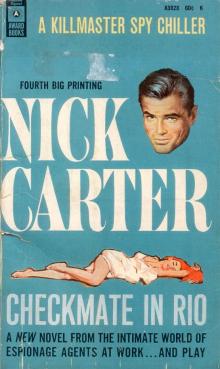 Checkmate in Rio
Checkmate in Rio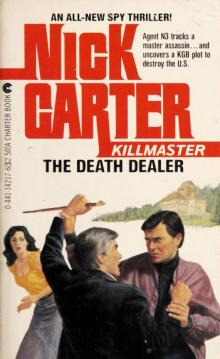 The Death Dealer
The Death Dealer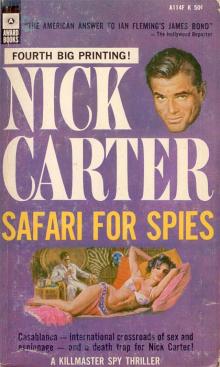 Safari for Spies
Safari for Spies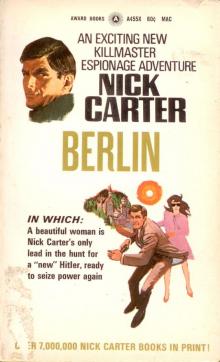 Berlin
Berlin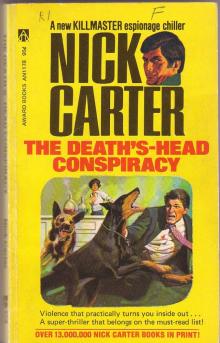 The Death’s Head Conspiracy
The Death’s Head Conspiracy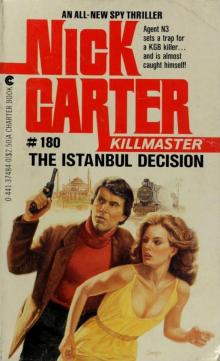 The Istanbul Decision
The Istanbul Decision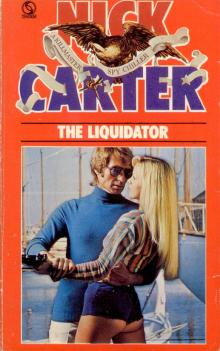 The Liquidator
The Liquidator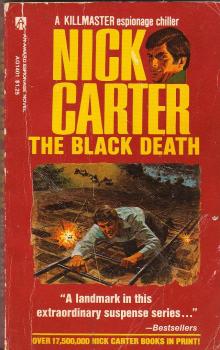 The Black Death
The Black Death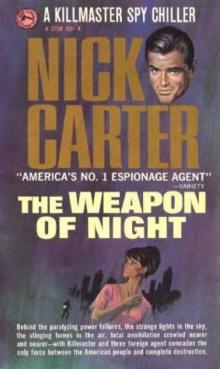 The Weapon of Night
The Weapon of Night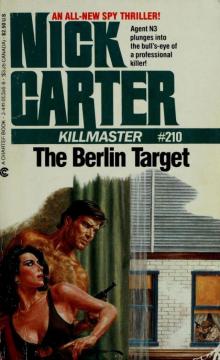 The Berlin Target
The Berlin Target Temple of Fear
Temple of Fear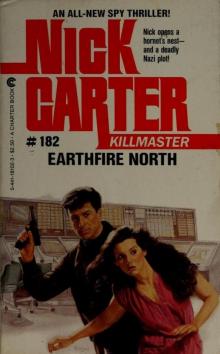 Earthfire North
Earthfire North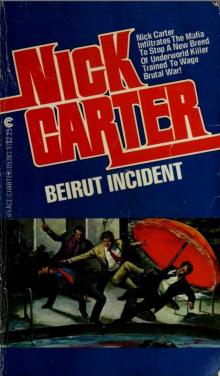 Beirut Incident
Beirut Incident White Death
White Death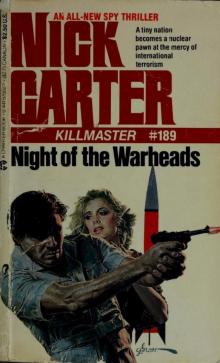 Night of the Warheads
Night of the Warheads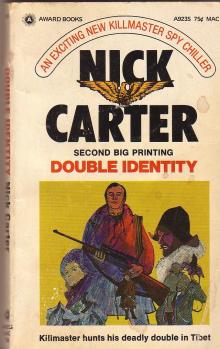 Double Identity
Double Identity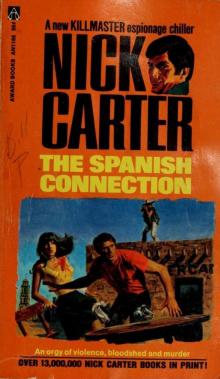 The Spanish Connection
The Spanish Connection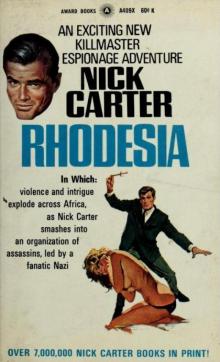 Rhodesia
Rhodesia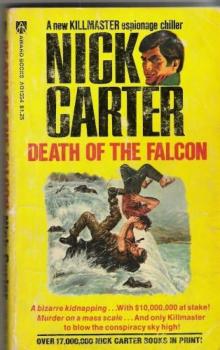 Death of the Falcon
Death of the Falcon The Executioners
The Executioners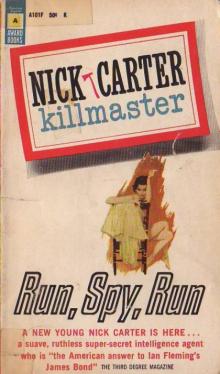 Run, Spy, Run
Run, Spy, Run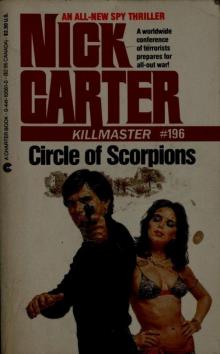 Circle of Scorpions
Circle of Scorpions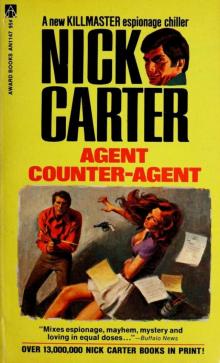 Agent Counter-Agent
Agent Counter-Agent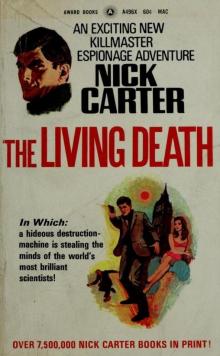 The Living Death
The Living Death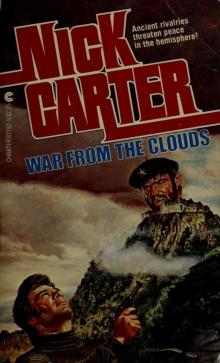 War From The Clouds
War From The Clouds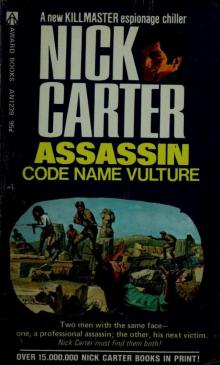 Assassin: Code Name Vulture
Assassin: Code Name Vulture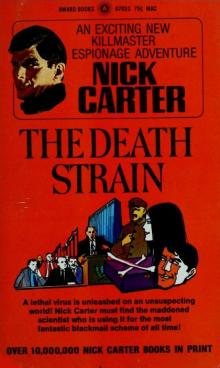 The Death Strain
The Death Strain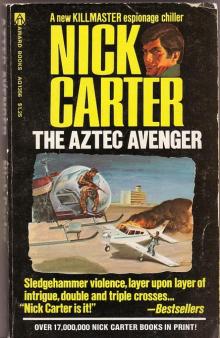 The Aztec Avenger
The Aztec Avenger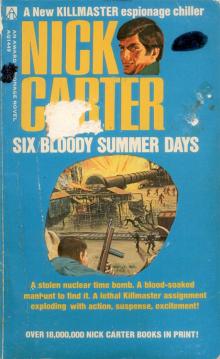 Six Bloody Summer Days
Six Bloody Summer Days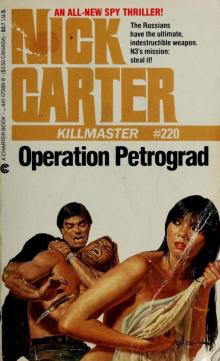 Operation Petrograd
Operation Petrograd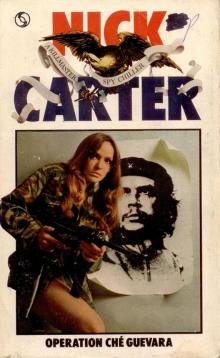 Operation Che Guevara
Operation Che Guevara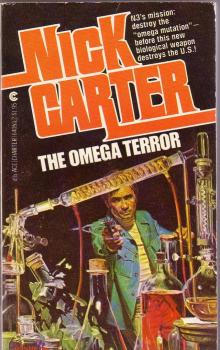 The Omega Terror
The Omega Terror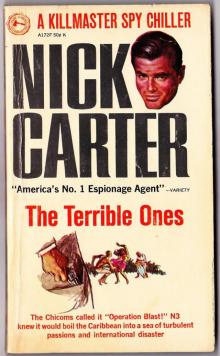 The Terrible Ones
The Terrible Ones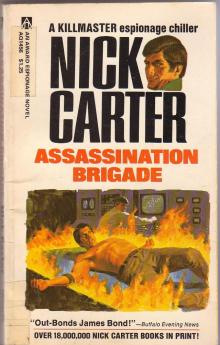 Assassination Brigade
Assassination Brigade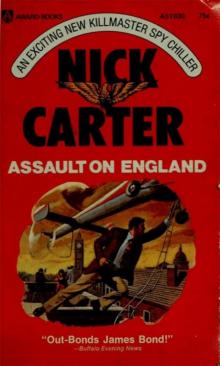 Assault on England
Assault on England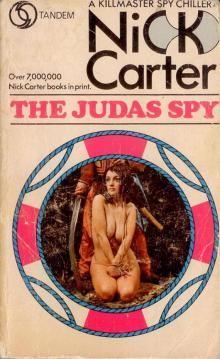 The Judas Spy
The Judas Spy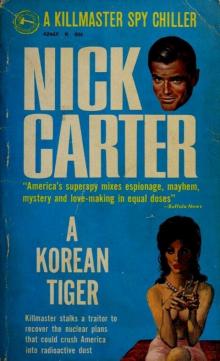 A Korean Tiger
A Korean Tiger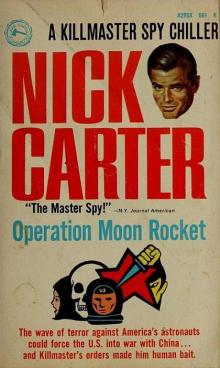 Operation Moon Rocket
Operation Moon Rocket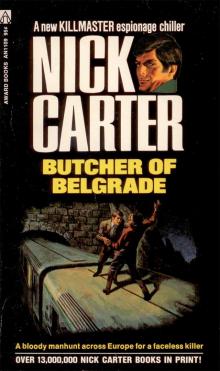 Butcher of Belgrade
Butcher of Belgrade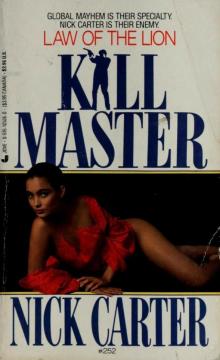 Law of the Lion
Law of the Lion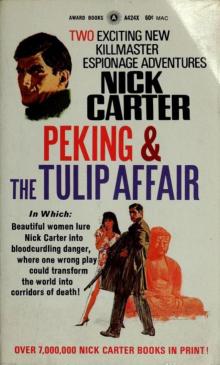 Peking & The Tulip Affair
Peking & The Tulip Affair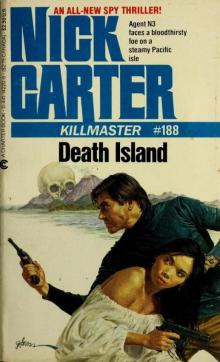 Death Island
Death Island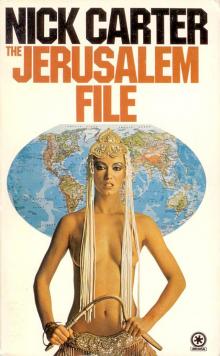 The Jerusalem File
The Jerusalem File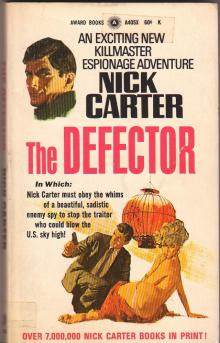 The Defector
The Defector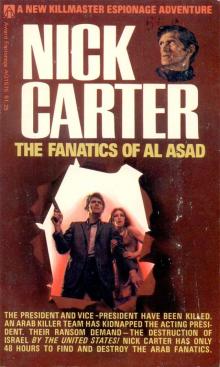 The Fanatics of Al Asad
The Fanatics of Al Asad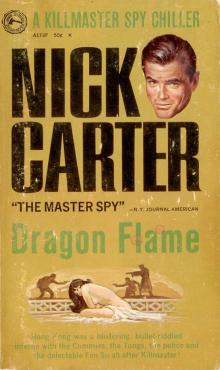 Dragon Flame
Dragon Flame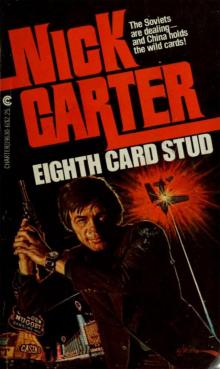 Eighth Card Stud
Eighth Card Stud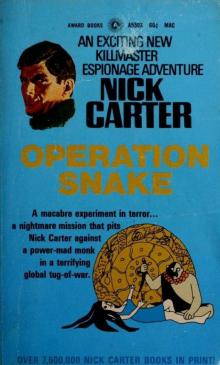 Operation Snake
Operation Snake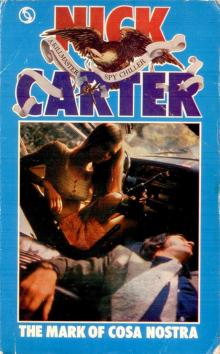 The Mark of Cosa Nostra
The Mark of Cosa Nostra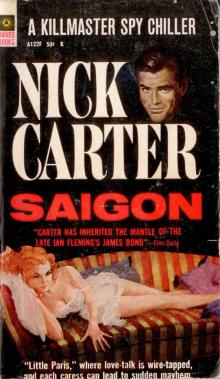 Saigon
Saigon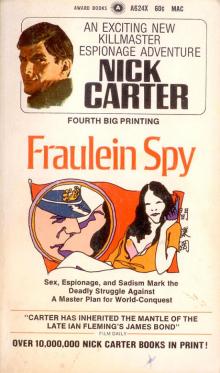 Fraulein Spy
Fraulein Spy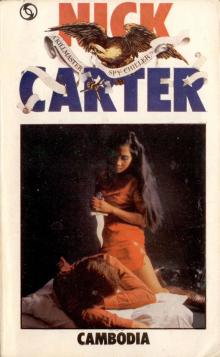 Cambodia
Cambodia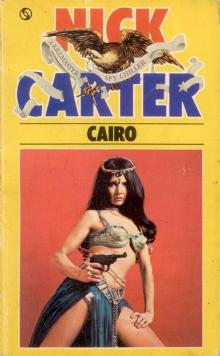 Cairo
Cairo